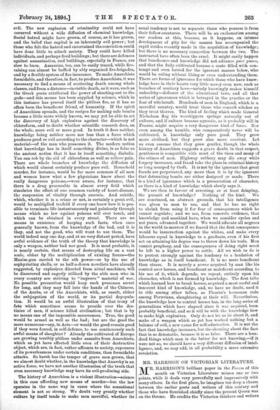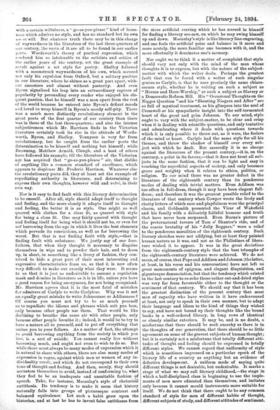MR. HARRISON ON VICTORIAN LITERATURE.
MR. HARRISON'S brilliant paper in the Forum of this month on Victorian Literature misses one or two points, while it deals very powerfully and impressively with many others. In the first place, he imagines too deep a chasm between the earlier poets and writers of this century and those who have flourished chiefly since the present Queen was on the throne. He credits the Victorian thinkers and writers with a certain wilfulness, a " go-as-you-please" kind of loose- ness which admires no style, and has no standard but its own B VP et will. But whatever truth there may be in this charge of waywardness in the literature of the last three-quarters of our century, the roots of it are all to be found in our earlier poets. Wordsworth's theory of poetical expression, which rendered him so intolerable to the satirists and critics of the earlier years of the century, set the great example of revolt against a set style for poetry. Shelley followed with a moonstruck waywardness of his own, which secured not only his expulsion from Oxford, but a solitary position in our literature, where he shines as a great poet apart, with- out ancestors and almost without posterity. And even Byron signalised his leap into an extraordinary rapture of popularity by persuading every reader who enjoyed his elo- quent passion, that he himself was a man apart from the rest of the world because he entered into Byron's defiant moods and loved to wrap himself in Byron's moody self-pity. There was a much more distinctly revolutionary element in the great poets of the first quarter of our century than there was in those of the last three-quarters ; and also the intense subjectiveness which Mr. Harrison finds in the Victorian literature certainly took its rise in the attitude of Words- worth, Byron, and Shelley. Tennyson is very far from revolutionary, but he caught from the earlier poets the determination to be himself and nothing but himself ; while Browning, Matthew Arnold, Clough, and a host of others have followed his example, till the literature of the Victorian age has acquired that " go-as-you-please " air, that dislike of anything like a common standard of excellence, which appears to displease Mr. Frederic Harrison. Whatever else the revolutionary poets did, they at least set the example of repudiating authority in literature, and determining to express their own thoughts, however wild and outré, in their own way.
Nor is it easy to find fault with this literary determination to be oneself. After all, style should adapt itself to thought and feeling, and the more closely it adapts itself to thought and feeling, the better it is as style. One might as well quarrel with clothes for a close fit, as quarrel with style for being a close fit. One may fairly quarrel with thought and feeling itself for being what it should not be, or even for not borrowing from the age in which it lives the beat elements which pervade its convictions, as well as for borrowing the worst. But that is not finding fault with style,—that is finding fault with substance. We justly say of our fore- fathers, that when they thought it necessary to disguise themselves in wigs and to powder their hair, and to dress up, in short, in something like a livery of fashion, they con- trived to hide a great part of their most interesting and expressive characteristics from us, so that it is now often very difficult to make out exactly what they were. It seems to us that it is just as undesirable to assume a regulation mask and domino in literature as it is in life, unless you have a good reason for being anonymous, for not being recognised. Mr. Harrison agrees that it is the most fatal of mistakes for admirers of Carlyle to write Carlylese. Why was it not an equally great mistake to write Johnsonese or Addisonese ? Of course you must not try to be so much yourself as to repudiate the idioms and phrases which suit you best, only because other people use them. That would be like declining to breathe the same air with other people, only because other people breathe it ; indeed, it would be to try to have a nature all to yourself, and to put off everything that unites you to your fellows. As a matter of fact, the attempt to avoid borrowing anything from the society in which you live, is a sort of suicide. You cannot really live without borrowing much, and ought not even to wish to do so. But while there must always be many modes of expression which it is natural to share with others, there are also many modes of expression in vogue, against which men or women of any in- dividuality revolt, and which do not correspond to their own tone of thought and feeling. And then, surely, they should accustom themselves to avoid, instead of conforming to, what they feel to be an inadequate and unsuitable fashion of speech. Take, for instance, Macaulay's style of rhetorical antithesis. Its tendency is to make it seem that history naturally falls into groups of picturesque contrast and balanced equivalence. Let such a habit grow upon the historian, and at last he has to invent false antitheses from
the there artificial craving which he has nursed in himself for finding a literary see-saw, on which he may swing himself up and down. Macaulay's style is like literary line-engraving, and one feels the artificial poise and balance in it more and more acutely, the more familiar one becomes with it, and the more effectually it dominates one's memory.
Nor ought we to think it a matter of .complaint that style should vary not only with the mind of the man whose thoughts it is to express, but with the nature of the subject- matter with which the writer deals. Perhaps the greatest fault that can be found with a writer of such singular genius as Carlyle, is that he uses precisely the same chiaro- oscura style, whether he is writing on such a subject as "Heroes and Hero-Worship," or such a subject as Slavery or a Democratic Reform Bill. His " Occasional Thoughts on the Nigger Question "and his "Shooting Niagara and After " are as full of mystical treatment, as his glimpses into the soul of Cromwell or his sympathetic insight into the self-tormented heart of the great and grim Johnson. To our mind, style ought to vary with the subject-matter, to be clear and crisp when it is dealing with scientific questions, and only tentative and adumbrating where it deals with questions towards which it is only possible to throw out, as it were, the feelers of the mind or heart. Carlyle had the same style for all his themes, and threw the shadow of himself over every sub- ject with which he dealt. But assuredly it is no charge against the literature of the present century,—it is, on the contrary, a point in its favour,—that it does not treat all sub- jects in the same fashion, that it can be light and easy in touching the superficial aspects of society, and only becomes grave and weighty when it relates to ethics, politics, or religion. To our mind there was no greater defect in the literature of the eighteenth century than its ponderous modes of dealing with trivial matters. Even Addison was too often in full-dress, though it may have been elegant full- dress; and therefore it was the greatest possible relief to the literature of that century when Cowper wrote the lively and chatty letters of which ease and playfulness were the principal charm, and Goldsmith presented the Vicar of Wakefield and his family with a delicately faithful humour and truth that have never been surpassed. Even Burns's picture of the preternatural terrors of Tam o' Shanter's ride, and of the coarse brutality of his " Jolly Beggars," were a relief to the ponderous moralities of the eighteenth century. Such literary sketches were not edifying, but at least they painted human nature as it was, and not as the Philistines of litera- ture wished it to appear. It was in the great deviations from the eighteenth-century style that the best triumphs of the eighteenth-century literature were achieved. We do not mean, of course, that Pope and Addison and Johnson (thelatter, at least, in his verse and his conversation) have not left us great monuments of epigram, and elegant disquisition, and gigantesque denunciation, but that the tendency which existed in the last century to re-echo those rather cut-and-dried styles was very far from favourable either to the thought or the sentiment of that century. We should say that it has been the greatest distinction of the present century that most men of capacity who have written in it have endeavoured at least, not only to speak in their own manner, but to adapt their language and idiom to the kind of things they wished to say, and have not bound up their thoughts like the bound books in a well-ordered library, in long rows of identical or closely similar exteriors. It may be, and is no doubt, a misfortune that there should be such anarchy as there is in the thoughts of our generation, that there should be so little agreement on some of the gravest subjects of human thought; but it is certainly not a misfortune that totally different atti- tudes of thought and feeling should be expressed in totally different styles. We cannot regard that uniformity of style which is sometimes impressed on a particular epoch of the literary life of a country as anything but an evidence of defective development. A uniform mode of saying quite different things is not desirable, but undesirable. It marks a stage of what we may call literary childhood,—the stage in which a half-disciplined class is beginning to use the imple- ments of men more educated than themselves, and imitates only because it cannot mould instruments more suitable for itself. We do not think that there ought to be any common standard of style for men of different habits of thought, different subjects of study, and different attitudes of sentiment.



































 Previous page
Previous page